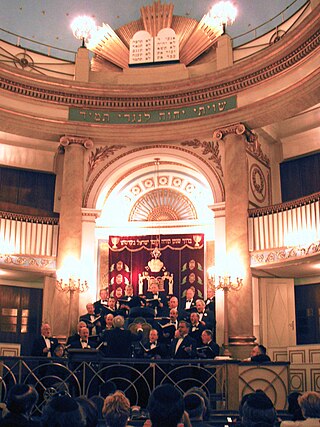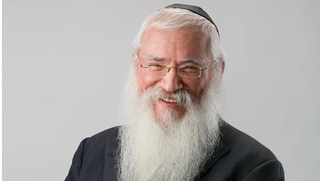Related Research Articles

Women in Judaism have affected the course of Judaism over millenia. Their role is reflected in the Hebrew Bible, the Oral Law, by custom, and by cultural factors. Although the Hebrew Bible and rabbinic literature present various female role models, religious law treats women in specific ways. According to a 2017 study by the Pew Research Center, women account for 52% of the worldwide Jewish population.

A hazzan or chazzan is a Jewish musician or precentor trained in the vocal arts who leads the congregation in songful prayer. In English, this prayer leader is often referred to as a cantor, a term also used in Christianity.
Sherwin Theodore Wine, Hebrew name שמעון בן צבי, Shimon ben Tzvi, was an American rabbi and a founding figure of Humanistic Judaism, a movement that emphasizes Jewish culture and history as sources of Jewish identity rather than belief in any gods. He was originally ordained as a Reform rabbi but later founded the Birmingham Temple, the first congregation of Humanistic Judaism, in 1963.

Humanistic Judaism is a Jewish movement that offers a nontheistic alternative to contemporary branches of Judaism. It defines Judaism as the cultural and historical experience of the Jewish people rather than a religion, and encourages Jews who are humanistic and secular to celebrate their identity by participating in relevant holidays and rites of passage with inspirational ceremonies that go beyond traditional literature while still drawing upon it.

The Society for Humanistic Judaism (SHJ), founded by Rabbi Sherwin Wine in 1969, is an American 501(c)(3) organization and the central body of Humanistic Judaism, a philosophy that combines a non-theistic and humanistic outlook with the celebration of Jewish culture and identity while adhering to secular values and ideas.
Jewish atheism refers to the atheism of people who are ethnically and culturally Jewish. Contrary to popular belief, the term "Jewish atheism" is not a contradiction because Jewish identity encompasses not only religious components, but also ethnic and cultural ones. Jewish law's emphasis on descent through the mother means that even religiously conservative Orthodox Jewish authorities would accept an atheist born to a Jewish mother as fully Jewish.
Jewish feminism is a movement that seeks to make the religious, legal, and social status of Jewish women equal to that of Jewish men in Judaism. Feminist movements, with varying approaches and successes, have opened up within all major branches of the Jewish religion.

The Humanist Institute is a training program for leaders within the humanist, and secular humanist movement.

Manis Friedman is a Hassid, rabbi, author, social philosopher and public speaker. He is also the dean of the Bais Chana Institute of Jewish Studies. Friedman authored Doesn't Anyone Blush Anymore?, which was published in 1990 and is currently in its fourth printing. He is featured in the documentary films: The Lost Key (2014), The Jewish Journey: America (2015), and "Patterns of Evidences" (2017).
The City Congregation for Humanistic Judaism, abbreviated as The City Congregation or TCC, is the only Humanistic Jewish congregation and synagogue, that is located at 30 West 26th Street, Lower Manhattan, New York City, New York, in the United States. It is the first Humanistic congregation in New York City to be led by a Humanistic rabbi.
Hashkafa is the Hebrew term for worldview and guiding philosophy, used almost exclusively within Orthodox Judaism. A hashkafa is a perspective that Orthodox Jews adopt that defines many aspects of their lives. Hashkafa thus plays a crucial role in how these interact with the world around them, and influences individual beliefs about secularity, gender roles, and modernity. In that it guides many practical decisions—where to send children to school, what synagogue to attend, and what community to live in—hashkafa works in conjunction with halakha or Jewish law.
The International Institute for Secular Humanistic Judaism (IISHJ) is the academic and intellectual center of Humanistic Judaism. It was established in Jerusalem in 1985 and, with its second center of activity based in Farmington Hills, Michigan. The Institute offers professional training programs for spokespersons, educators, leaders, and rabbis, in addition to publications, public seminars, and colloquia for lay audiences. It has also trained music leaders and cantors, though those programs are not currently active.
Yaakov Malkin was an Israeli educator, literary critic, and professor emeritus in the Faculty of Arts at Tel Aviv University. He was active in several institutions that deal with both cultural and Humanistic Judaism.
Tamara Ruth Kolton is an American non-denominational rabbi and clinical psychologist. She was the first person ordained as a member of the Humanistic Jewish movement. Over time, her religious position evolved from agnosticism to a more spiritual perspective that drove her away from Humanistic Judaism. Kolton later became known for her controversial feminist reinterpretation of the Biblical Eve, which has received both support and criticism from other religious and spiritual writers.
Or Emet, officially the Minnesota Congregation for Humanistic Judaism, is a Humanistic Jewish synagogue and congregation in Minneapolis – Saint Paul, Minnesota, in the United States. The congregation is a member of the Society for Humanistic Judaism. It is a community of cultural Jews, secular Jews, Jewish humanists, and other humanists, united by a commitment to humanism and by respect and support for Jewish culture, traditions, and Jewish identity, and by those traditional Jewish values most consonant with humanism — tikkun olam, social justice. Or Emet embraces a human-centered philosophy that combines rational thinking and scientific inquiry with the celebration of Jewish culture and traditions.
Sivan Malkin Maas is an Israeli cleric who was the first Israeli to be ordained as a rabbi in Humanistic Judaism.

Machar, officially Machar, The Washington Congregation For Secular Humanistic Judaism, is a Humanistic Jewish congregation located in the metro area of Washington, D.C., in the United States. Affiliated with the Society for Humanistic Judaism, the non-theistic congregation was founded in 1977, and celebrates Jewish culture, education and celebrations. The congregation has a Jewish cultural school, social action committee, and regular newsletter, and welcomes interfaith couples.
This is a timeline of women rabbis:
Oraynu Congregation for Humanistic Judaism, founded in 1969, is Canada's first Humanistic Jewish congregation. It is based in Toronto, Ontario and is affiliated with the Society for Humanistic Judaism.
This is a timeline of LGBT Jewish history, which consists of events at the intersection of Judaism and queer people.
References
- ↑ "Humanistic Judaism's Rabbi Miriam Jerris will be leading Rosh Hashanah services at Kol Hadash next month. | j. the Jewish news weekly of Northern California". Jweekly.com. 2010-08-05. Retrieved 2013-10-04.
- ↑ "AHR Officers" . Retrieved 29 October 2014.
- ↑ "Rabbi Miriam Jerris Visiting Beth Ami". Boulderjewishnews.org. 2010-11-04. Retrieved 2013-10-04.
- ↑ "An Day with Rabbi Miriam Jerris from the Society for Humanistic Judaism". hjccohio.org. Retrieved 2013-10-04.
- ↑ "Rabbi Miriam Jerris, Phd". Ifshj.net. Retrieved 2013-10-04.
- ↑ "Rabbi Jerris to lead Secular Humanist event « AZ Jewish Post". Azjewishpost.com. 2012-09-07. Retrieved 2013-10-04.
- ↑ "Judaism without God". The Jewish Chronicle. Retrieved 2013-10-04.
- ↑ "Society for Humanistic Judaism - Rabbis and Leadership". Shj.org. Archived from the original on 2013-09-28. Retrieved 2013-10-04.